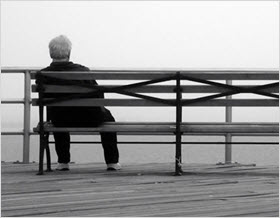Doctors dismiss grief of bereaved elderly as depression
Fiona MacRae for the Daily Mail writes how suffering from bereavement, many older people seek help from a GP to cope with the crushing feeling of loneliness.
But they are often misdiagnosed with depression – and given powerful drugs they don’t need, a study claims.
Widows and widowers are also tarred with the stigma of mental illness, say experts.
Researchers said that while people battling grief go on to develop full blown depression, many do not.
Those who lose their spouse often withdraw from social contact – and tackling this loneliness could help prevent their health from deteriorating further.
Dr Eiko Fried and other researchers at the University of Leuven in Belgium questioned elderly volunteers on their mental health and found those in mourning suffered mainly from loneliness – which can be a symptom of depression.
The study, published in the Journal of Abnormal Psychology, suggested that the loneliness could be so overwhelming it could lead them to being classed as depressed, despite having few other symptoms.

GPs are then too quick to dish out antidepressants without considering how to tackle feelings of solitude.
It is estimated one million elderly Britons are chronically lonely, with many not seeing or speaking to someone every day.
Almost a quarter of those aged over 75 who live alone go whole days without any human contact – face-to-face or over the phone.
And recent research has also shown that loneliness can have a worse effect on health than obesity and can be as bad as smoking 15 cigarettes a day.
It can also create deep mental scars, with research showing it increases the risk of depression and raises the odds of developing dementia by up to two-thirds. Caroline Abrahams, of charity Age UK, said the issue could be tackled by GPs identifying symptoms and alerting local services that can offer support.
She said: ‘In practical terms people’s lives can change dramatically, meaning they may have to eat, sleep and live alone for the first time, increasing the risk of feeling lonely.
‘Feeling lonely not only makes us miserable, it increases our risk of developing serious mental and physical health problems.
‘Families and communities can make a huge difference to the lives of older people living alone, particularly those who have recently lost a spouse or partner. This can be as simple as making time for older relatives and checking in on older friends and neighbours that we know.
‘GPs can help by identifying symptoms and sign-posting to local services that can help people to stay connected and not presume that somebody staying at home with little human contact is an acceptable outcome of care.’



